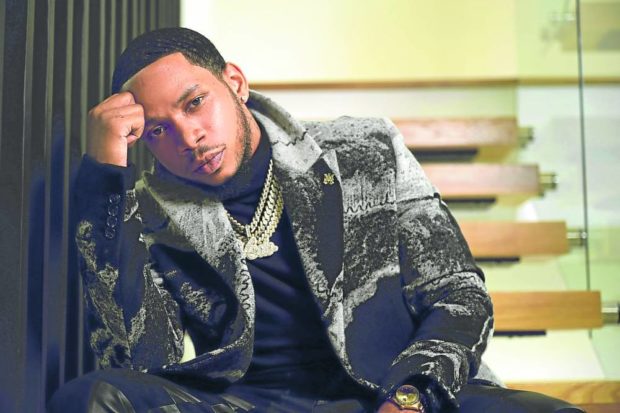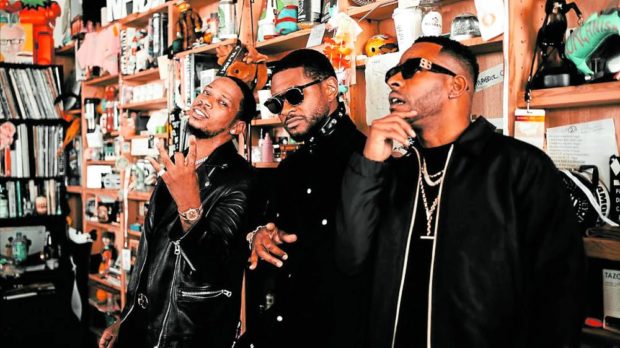Singer Vedo on Usher, EXO and bringing vulnerability back to R&B
Singer-songwriter Vedo has learned a great deal about life and music from working with R&B legend Usher. But if there’s one piece of advice that stood out to him most, it’s this: “Start believing in yourself.”
It may sound too simple—clichéd, even—but it was something that he needed to hear back when he was just starting out and trying to find his footing in the industry.
“The main thing that stuck with me was that he told me to start believing in myself; start believing that whatever I put out will blow up or go platinum. He gave me words of encouragement, saying that I can be the best and eventually reach the top spot,” he told the Inquirer in a Zoom interview.
In 2013, Vedo auditioned for the fourth season of the reality talent search “The Voice.” Usher was the only coach to turn his chair around. He took Vedo under his wing and they have since become good friends and collaborators, both onstage and in the studio. “We got closer and I appreciate his insight,” said Vedo, who has written songs, opened shows and sang backup for Usher.
“He also told me to stay true to myself and don’t let other people create your identity for you. Because at that point, you become a puppet,” the 30-year-old artist added. “I needed to hear those things, especially from someone like him, because I did have doubts. But I overcame those.”
Diverse sound
With such hits as the double platinum single “You Got It,” “4 Walls” and “Let’s Get Married,” Vedo has become one of the most notable voices in R&B today. He has also established himself as a songwriter and producer, churning out material for Usher, Chris Brown, Ella Mai and even K-pop bands like EXO, NCT 127, SHINee and SuperM.
Last January, Vedo released his sixth studio album, the “sultry and edgy” “Mood Swings” (under Empire), which depicts a man’s vacillating moods as he navigates through “the complexities of love and relationship.” The sound is just as diverse with ballads like “Forever,” which could very well be a wedding song, and bops like “Do You Mind,” a fun summer anthem featuring Chris Brown.
“This is my first album where I actually had a team of writers come in and assist me with this project, and we all got the chance to learn from each other. But the music speaks for itself, and we just want you to feel whatever the emotion or mood is,” Vedo said.
Our Q&A with Vedo:
Tell us about “Mood Swings.”
It’s my most transparent, most straightforward album yet. There are songs that speak about insecurities, shortcomings, loving oneself, being in a harmonious love, and even the occasional moments of cockiness. It’s an album that covers a full spectrum of different moods.
What inspires your writing? Personal experiences or observations?
I would say both. Some of the songs are definitely from personal experiences; the others, from people I have encountered.
One way I get inspiration is that I go to a bar and just sit, get a couple of drinks and grab something to eat. I sit next to a stranger and strike up a conversation. You never know how open some people can be. A few of my songs are about the people I have met and their everyday struggles.
Your songs seem to strike a balance between contemporary and that 1990s/2000s R&B sound.
There’s this talk about R&B being dead and not being the same anymore. And I kind of want to let people know that R&B is here. It may sound different, but it evokes the same emotions ’90s and 2000s R&B did.
I want to stay true to that because that’s the music I grew up with. But I also know that music evolves dramatically and drastically, so you have to keep up with the times. I can’t be here doing songs that sound like songs from the ’80s or ’90s. I can sample them and make them sound modern, but you just have to keep the essence and merge them.
What elements of past generations of R&B do you bring to your music now?
The vulnerability. A lot of music back in the day was like being on bended knee, singing in the rain or trying to get a loved one back. I’m bringing that emotional aspect of it; things like taking accountability, saying sorry, making things right.
Today, I feel like people are scared of appearing too soft, or of being transparent because they may come off as a simp. But I think R&B is about love and forgiveness, family and finding that special someone to spend forever with. That’s what R&B should do for you. It should make you feel all those things. Those are the things I bring in.
And people miss singers who can really sing. How important are vocals today?
Vocals are important, especially when you’re singing live or have a concert. But I have to be honest with you. It doesn’t really matter if you can sing nowadays. If popularity and sales rely solely on vocal ability, then I know a lot of people who would be very famous now.
However, at some point, you should be able to hold a note and sing. Because people are going to have to hear you live, and you don’t want to be the singer who sounds good only in the studio.
You’re used to working on your songs alone. What was it like collaborating with other songwriters?
It’s good because I controlled the room, the narrative. It’s my album. I had the say on what I want to sing about and in what form or fashion. Everything was smooth. Everyone was amazing. No one fought over whose line or melody is better. I have always had respect for writers as talented as the people who stepped into my room who lent their pen to finish my album.
Which came first, singing or songwriting?
My first love was performing… But later on, I came to the realization that we have to start making some money to pay the bills and fund a career. And the only way we saw fit was to get (music) placements and start collecting publishing checks. At that point, we made the decision to start writing songs.
My first placement was for the K-pop group EXO. From there, the checks started rolling in and we were like, “Uh-oh… I guess we’ll keep doing this!” Fast forward, I was writing songs for Chris Brown, Usher and Ella Mai.
How did you get that K-pop gig?
It just so happened that my manager was a retired military person and knew people in the music industry over there (in South Korea). He said that he had an artist who writes songs; that maybe they could give me a shot to write songs for a K-pop band. I didn’t even know what K-pop meant then. And so, I wrote the songs as if I was going to put them out for myself, and they loved them instantly.
How important is it to have your own catalog and not having to depend on others for material?
It’s amazing anytime you have ownership of something. It’s like real estate, in a way, something you can pass down to your kids and loved ones. It’s like having your own history sheet where you can check my credits, what I have created over the years.
What’s it like working with the likes of Chris Brown and Usher?
Amazing guys. They’re super funny, insightful, intelligent. And extremely talented. You understand why these people are famous and renowned. They work so hard. Some would think that artists of their stature would just sit back, chill and do the minimum. But these guys are workaholics.
Tell us about collaborating with Chris on “Do You Mind?”
It was fun. At first, I was scared because I didn’t think it was going to happen… But all in all, it was a learning process that taught me patience, consistency, persistence. Some people may think, “Oh, this artist is too good to do a song with me.” But I was like, I understand you’re Chris Brown and you’re popping. But I’m going to keep asking till you feel like I’m good enough to do this song with you.
You and Erick Bellinger sang backup for Usher’s Tiny Desk Concert. And you three had a little moment there… you guys went viral.
We didn’t think it was going to blow up that much. We thought it was just going to be, “Oh OK, we see Vedo in the background.” But wow, it was like, people were truly surprised and pleased with the way we sounded and blended and meshed. And we went viral. I felt good about it. It was a nice moment because it wasn’t planned at all.
What other goals do you have?
I definitely want to win a Grammy and dabble in acting. I just want to expand my portfolio. INQ
















